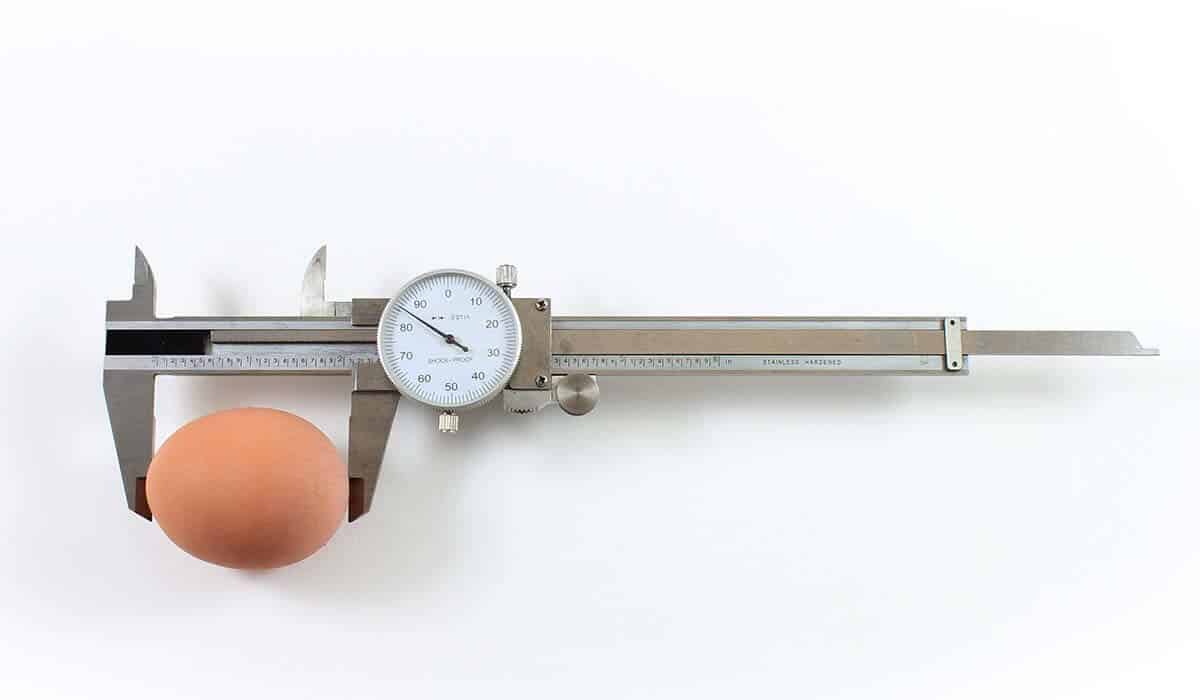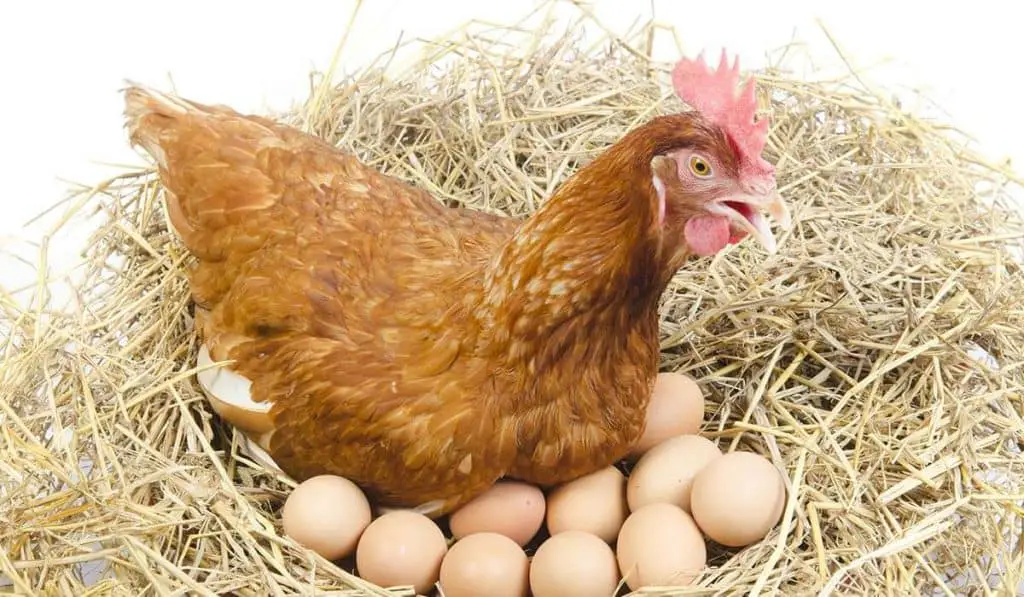Keeping chickens can be a great idea to get a steady supply of eggs. Also, since you’ll be responsible for the chickens’ health, you’ll ensure that the eggs they lay meet your preferences.
However, when it comes to the size of the eggs, you may be wondering. Do chickens lay bigger eggs as they get older?
Luckily, the answer is yes. Smaller chickens lay small eggs, and as they get older, the size of their eggs gets larger as well.

In this article, we’ll discuss everything related to egg size and how to make sure your chicken lays bigger eggs.
*This page contains affiliate links to products I recommend. If you purchase something from this page, I may receive a small percentage of the sale at no extra cost to you
Comparing Chicken Age and Egg Size
Since you’re aware that the age of your chicken and her egg size are linked, we’ll give you a quick comparison between these two things.
When a hen lays her eggs for the first time, those eggs are the smallest in size. These eggs usually weigh between 18 to 20 ounces per dozen. If the hen is smaller than the average size of her age, she can lay eggs that weigh even less than 19 ounces per dozen.
During this period, the eggs tend to have a much softer shell than the eggs that are produced later. Most importantly, the number of eggs produced at the beginning of the cycle is little.
Later, when the chicken becomes older, the eggs go from small to medium, to large. By 40 weeks of age, chickens can lay large, extra-large, or even jumbo eggs. In fact, the chickens will lay eggs more frequently than when they were younger.
To many people, a jumbo egg can be the best egg to have for breakfast. Yet, it’s not every day that a chicken will be able to produce a jumbo egg. Not to mention that these eggs can be hard and painful to lay because of their enormous size.
Averagely, chickens produce large eggs once they reach full adulthood, and these eggs are what you’ll find at the supermarket. The eggs usually weigh between 24 and 27 ounces per dozen.
Still, you can tinker with your chicken’s eating habits as well as its surroundings to help it lay extra-large eggs.
In the following section, we’ll give you a few tips on how to achieve this task.
Factors You Can Customize to Get Bigger Eggs

Even though you can’t simply change the way nature works, you can still control several variables to get bigger eggs.
Your Hen’s Body Weight
It’s a fact that a bigger hen produces bigger eggs. Not just that, but larger breeders also have their impact on creating larger eggs.
Ideally, if the pullet weighs at least 3 pounds at the beginning of her egg production cycle, you can expect the eggs to be big. Furthermore, the more this chicken grows, the larger its future eggs will become.
Of course, this factor is easy to control. When choosing the right hen to breed, go for the one with the heaviest body weight.
The Skeletal Size of Your Chickens
Not only is the body weight of a chicken related to her egg size, but also the size of her bones. Hens with bigger and longer bones tend to produce larger eggs.
The good news is that you can increase the skeletal size of your chicken by giving it a high-protein diet as it grows. You can do this until your chicken is ten weeks of age.
Yes, some people only feed their chickens high amounts of protein until six weeks of age. However, extending this period to eight or ten weeks can give you a hen with a larger skeleton size.
As a result, you can depend on this hen to produce larger eggs eventually.
Protein Levels in the Feed
The amount of protein in your chicken food can have a high impact on your feathery friend’s egg production. Luckily, you can increase the protein levels in the feed at several stages of production.
For instance, in the first couple of months of production, you can include an 18% to 20% protein ration in your chicken feed. While these percentages are high, they’ll only do their job for a limited period of time.
When your chickens produce their maximum egg size, you can no longer bring this protein ration to the equation. This is because high protein diets won’t have any effects on the egg size anymore.
Yet, when the chickens become 36 weeks of age, you can feed them rations with only 15% to 17% protein. This way, the increase in egg size will slow down, which is necessary to prevent defects in eggs.
Exposure to Light
The behavior of chickens and their body functions are highly influenced by light. It doesn’t matter if it’s natural daylight or an artificial light system, a chicken’s body responds to the exposure of light.
Therefore, it’s only normal for egg production to be affected by lighting programs. See, the change in the lighting system can either accelerate or delay the age at which hens start to lay eggs.
So, how can you use this knowledge to get bigger eggs?
We recommend that you expose your chicken to only ten hours or fewer to light each day. Keep this routine going until the hen is about 19 weeks of age. By then, the hen will be larger and will be able to produce large eggs during her first production cycle.
As a result, the eggs will keep getting bigger and bigger from now on.
Feed Intake
This factor goes without saying. The amount of feed that your chickens get each day will have lasting effects on the size of her eggs. The more nutrients your hen consumes, the larger her eggs should be.
Yet, although your chickens may be properly fed, there might not be a noticeable increase in the size of their eggs. In this case, you must look for other factors that could limit feed consumption.
For instance, your chickens may be staying in a crowded coop, which can be stressful. Overcrowding causes uneven feed and water distribution, so the feeding patterns can be unsteady.
Also, if the temperature is too warm inside your chicken pen, your little buddies will slowly lose their appetites.
Therefore, you’ll need to make sure that your chickens have enough food, water, and comfortable living conditions to produce large eggs.
Once you adjust all the previous factors to your needs, you’ll have a bigger chance of getting extra-large or jumbo eggs.
FAQs
How long do chickens lay eggs?
When chickens become old, their egg production will start to decrease. On average, chickens can keep laying eggs until they’re six or seven years of age. Full retirement will come soon after that.
Since the life expectancy of a hen is between eight and ten years, it’s fair to say that laying eggs is a major part of her life.
How to tell if my chicken is ready to lay eggs?
It’s easy to know when your chicken is prepared to lay her eggs. Here’s what to look for.
- If the hen start searching for more privacy
- Scratching around her nesting box and fiddling with the bedding
- Spending a long time inside the nesting box
- Crowing or calling out to the rest of the flock
- If you notice signs of strain on your hen
If your chicken spends a few days inside the nesting box looking strained without producing eggs, she might be facing an issue. In this case, you must contact the vet.
Conclusion
As your chickens get older, they will most likely lay bigger eggs. There’s a strong relationship between the size and age of the chicken and how big her eggs are. Of course, there are more factors at play that you can control to get larger eggs.
However, we personally suggest that you think twice about aiming for jumbo eggs. Being the largest, laying jumbo eggs can be exceptionally painful to chickens, which is the last thing you want for this little, soft creature.